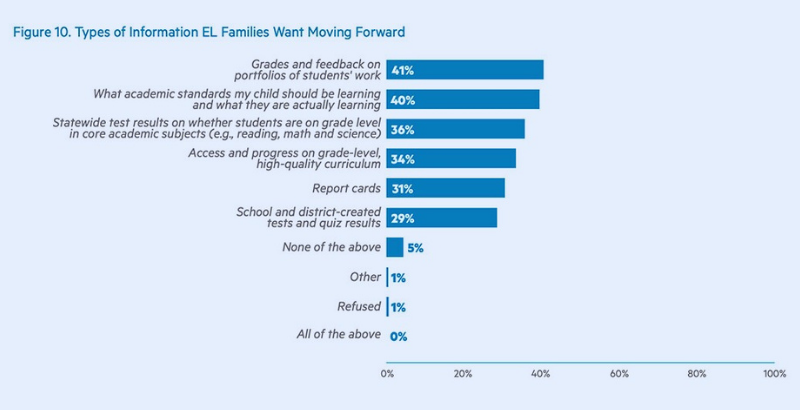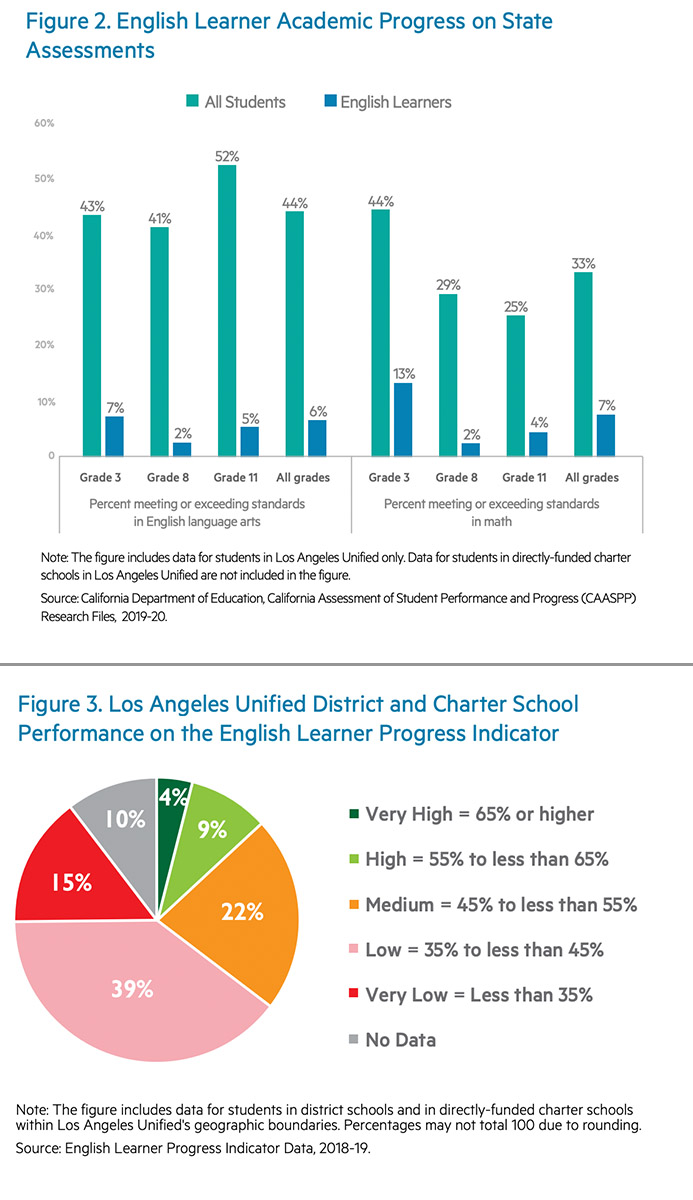Majority of LAUSD English Learners Fail to Meet State English and Math Requirements; Families Want Change

Get stories like this delivered straight to your inbox. Sign up for The 74 Newsletter
This article is part of a collaboration between The 74 and the USC Annenberg School for Communication and Journalism.
The majority of English learner students in Los Angeles Unified district schools failed to meet state math and reading standards in the latest round of assessments, prompting parents to call for better communication with their children’s schools, according to a new report.
In 2018-19, just 11.5% of English learner students met or exceeded state English Language standards, compared to 50.43% of all LAUSD students. Just 12.4% of English learner students met or exceeded state math standards, while 39% of all students met or exceeded math standards, according to California state education department data.
“English learners in the district are not performing at the level they should be … [they] are such an important subgroup for the district to consider … especially a group that is this large,” said Jeimee Estrada-Miller, an author of the report, conducted by Loyola Marymount University, which found alarmed caregivers of English learner students want more communication and resources from their children’s schools.
According to the U.S. Department of Education, LAUSD has the highest number of English learners in the country, with more than 86,000 students classified in that category. Nearly half of all LAUSD students this year have been classified as English Learners at some point in their schooling.
According to the brief, more than half of LAUSD schools were performing “low” or “very low,” meaning that less than 35% of students at the school were advancing in English proficiency.
This chart shows the breakdown of how LAUSD schools are performing on English Learner progress. Just 4% of schools are in the “very high” category – meaning that 65% or more of the students at that school have moved up a level in English proficiency or are at the highest level of proficiency.

“These numbers are definitely alarming … but LAUSD is not an outlier… At baseline students need to become proficient in English before they show that they can master the material on these state tests,” Estrada-Miller said.
She called on newly-appointed LAUSD school superintendent Alberto Carvalho “to think about what practices the district should prioritize with English learners in mind.”
In findings based on a poll of 500 families — 29% of whom have children classified as English learners — conducted in collaboration with Great Public Schools Now and Families In Schools:
1 English Learner Families Find Feedback on Students’ English Language Progress More Helpful than a Report Card
It is important for the district to prioritize students learning English first. Once students have proficiency in English, they usually begin to do better in other subjects that require access to the English language, Estrada-Miller said.
When English learner families say that they want feedback on their childrens’ work, they are particularly interested in their child’s progress in English language proficiency.
Right now, a majority of families receive feedback about their children from report cards, which are often too general and do not include specific progress toward English learning, Estrada-Miller said. “We see a grade on a report card, which is a lot about work completion … but English learner families need to know whether their kids are making progress towards learning English first… That is a milestone for English learner students to be able to access the rest of the curriculum.”
2 English Learner Families Want Personalized Communication From Schools
English learner families see the value in having more personalized communication from their schools.
“We were really surprised to see how many English learner families want home visits … that’s really as personal as it gets,” Estrada-Miller said. “I think this shows us that there is a desire for a real relationship with the school. A connection with school staff is even more important for English learner families. When language is a barrier, they want that personal touch.”
40% of English learner families prefer a personal phone call by a school staff member for updates on their child, whereas just 30% of non-English learner families prefer a phone call. 22% of English learner families said they prefer an in-person home visit from a staff member.
3 English Learner Families Want Schools to Function Like Communities
During the pandemic, many schools began providing extra services, such as meals and health care. High-needs families, including many English learner families, want this to continue even as the pandemic dies down, Estrada-Miller said.
“Schools are hubs for communities. It’s clear that people need more from their schools. English learner families want deeper infrastructure for schools to sustain these other roles, like child care, legal services, and mental health services.”
39% of English learner families ranked mental health services for their kids and themselves at school the highest priority for the district. 37% ranked academic support and tutoring services highest, and 35% most want non-academic after school programs.
English learner families are already showing up to school events and extra programming in large numbers. 86% of English learner families polled said that they participated in school activities at least once a month.
“Families are already showing up and they want schools to take on a bigger role … the question is really can we build the infrastructure?” Estrada-Miller said. “Can schools get the ongoing funding to support those types of services so that they function more like community schools?”
Newly-appointed LAUSD superintendent Alberto Carvalho targeted the need to engage vulnerable students such as English learners in his 100 day plan with a parent academy and a new attendance strategy. The district’s chief academic officer, Alison Yoshimoto-Towery, said LAUSD is currently providing resources for English learners such as tutoring, counseling, small group work and personalized family meetings to discuss students’ progress on learning English.
Rebecca Katz is a recent graduate of the USC Annenberg School for Communications and Journalism Masters Program and a Los Angeles native. She received her bachelors in English literature and political science from USC. She is passionate about mental health and education reform.
Get stories like these delivered straight to your inbox. Sign up for The 74 Newsletter

;)